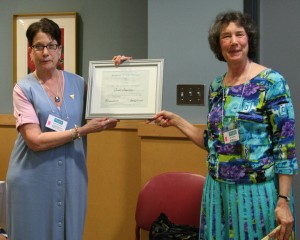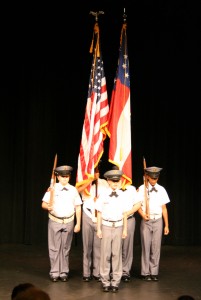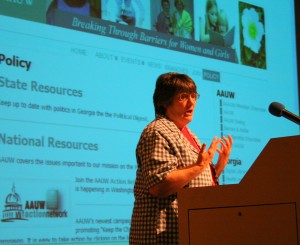Highlights of the AAUW State Convention
We opened the convention in the dining hall of Georgia Military College in Milledgeville with Ann Bertoli (Milledgeville) as host, Marlene Humphry (Warner Robins) as registrar and Evelyn Merk (Warner Robins) as credentials chair. Programs were prepared by Diana Witt and Stephanie Babbitt of the Atlanta branch. Varie Rustin, co-Membership VP, led a candle-lighting ceremony honoring our members who have passed away.
After dinner, Rustin and co-Membership VP Carlene Beck presented Ten-Star and membership awards (listed elsewhere) and Laurie Shaw presented EF and LAF awards to the branches. Humphry presented Georgia AAUW Achievement Awards to Ann MacKay (Warner Robins) and Carol Stephens (Cobb).
Next we proceeded to the very impressive concert hall for a presentation on the new Association bylaws by Carol Newnam, our Regional Director. Carol did a fine job of clarifying the changes and the reasons for them. The evening concluded with a reception at the Comfort Suites Hotel.
Morning sessions commenced with a smartly executed presentation of the colors by a group of girls from the middle-school division of Georgia Military College. Ann Bertoli, a retired mathematics instructor from GMC, explained that the school enrolls students from middle school through the first two years of college. Next we were greeted by the mayor of Milledgeville, Richard Bentley, who presented us with a framed proclamation naming the weekend of April 24–25 as the AAUW Weekend. The opening session concluded with communications chair Marie Bruner’s presentation of the new AAUW–GA website built on a WordPress platform by Ann MacKay. It looked especially impressive on the large screen in the concert hall!
As requested, Dr. Sunita Manian of Georgia College and State University and Susan Pavlin of Refugee Family Services (and the Atlanta branch) challenged us to become involved with women from other cultures not completely unlike us. Manian emphasized that education for women makes all the difference, and cautioned that economic sanctions against other countries hurt women disproportionately. We need expert advice to decide what will help: for example, headscarves may allow women to go to school rather than staying home to maintain traditional modesty, and textile factory jobs may give women a chance for economic power. Pavlin echoed the theme of education for girls. She pointed out that simple things can help: women’s sanitary products would allow Maasai girls in Kenya to go to school comfortably, and women’s ownership of the milk they get from cows they do not own helps them gain some economic independence. The Atlanta branch is sponsoring two young women each year from Refugee Family Services who need mentoring and financial support to prepare for college.
Following our three public policy priorities determined a year ago, the next session encompassed STEM education, pay equity, and health. Lynn Fountain, immediate past president, gave a fact-filled presentation on STEM (science, technology, engineering, and mathematics) education for girls. She suggested that girls need opportunities to develop their spatial-manipulation abilities by practical problem-solving. They need to see STEM fields as helping fields. Even though women are in the STEM pipeline, they are being discouraged by the culture and environment they find in the workplace. Pat DeWitt, current president, reported on pay equity. With Equal Pay Day only a few days away, she reminded those present of AAUW’s pay equity resources on the Association website. Exhibiting some local statistics on pay equity obtainable from the US Bureau of the Census website, she challenged members to write op-ed pieces highlighting these local conditions. She also suggested a program to recognize the most family-friendly employers in each branch’s area. Finally, Debbie Karvey, current treasurer, reported on women’s health issues: some successes and some failures in the last Georgia legislative session. Stimulus money was used to fill some deficits in family planning and teen pregnancy prevention, and the Medicaid waiver for family planning services received some seed money. At the same time, there were many attempts to restrict access to family planning services, further restrict or ban abortion, regulate infertility facilities/treatments and a real effort to elevate the legal status of an embryo.
Lunch included a presentation on EF and LAF by Laurie Shaw, and an introduction of Shyria Coleman of 9to5 Atlanta Working Women, who had led the student group in a job-negotiation workshop.
After lunch we were treated to a Branch Showcase featuring two of our strong branches, Atlanta and Warner Robins. Pat DeWitt also reported on a visit to the Valdosta branch’s Sister to Sister Summit. The annual business meeting followed, in which we elected new officers, and concurrently Anna Rhau-Bernhard of North Fulton branch met with the student group in a discussion of health.
The day ended on a high note with a cross-generational dialogue with two very articulate Student Advisory Board members: Jasmine Brandon from Savannah College of Art and Design and Rachel Zudekoff from Georgia College and State University. The students verified that “equity is still an issue,” but they had been able to stand up for themselves. When asked how we can help, they mentioned working for pay equity and providing networking and learning opportunities—like the ones we provided during the convention.



